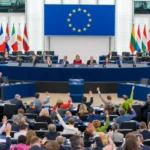To mobilize young people before the European elections, two organizations (Make.org and JEF Europe) asked them to participate in a major citizen consultation, “EurHope”. The 5,069 proposals received were then put to a vote by participants, the results of which were presented on Friday, November 10.
In the 1.5 million votes cast, we perceive a European youth, up to 35 years old in this survey, concerned about ecology, transparency and greater integration in education and health policies. .
What there is consensus: ecology
Unsurprisingly, young people have developed many proposals on the fight against global warming. Among the most defended ecological ideas: accelerating the energy transition and the reduction of carbon emissions, strengthening the protection of biodiversity, supporting industries that move towards recycling and sustainability… But also a call to develop more efficient rail transport and more accessible.
On an institutional level, after the corruption affair within the European Parliament, “Qatargate” discovered at the end of 2022, we also find a strong demand for stricter rules to fight against this type of behavior. Create an institution to study and prosecute these corruption cases, prevent excessive influence from lobbies, bring politicians’ salaries closer to the median salary… These proposals achieve consensus against a background of strong distrust with regard to political representation in general.
To protect jobs, participants overwhelmingly supported the idea of Made in Europe, in particular to find a European industry and independent production. This also involves European support in education policies, both in increasing the salaries of teachers and in guaranteeing free access to university.
What there is no consensus: the institutional future of the EU
Not everything is unanimous in this great continental survey. On institutional issues for example, if the idea of a more integrated Europe is validated, its expression in the future mode of operation is much more divided. No blank check for a federal Europe, but not for a Europe of Nations either. These ideas sparked a strong debate among the participants. Among all these ideas, however, one arouses more agreement: that of an assembly responsible for drawing up a constitution for Europe.
For the climate too, the operating mode divides. The decisions taken at European level seem to be frightening. Whenever a proposal is relatively vague and refers to ecological measures without detailing the specific sector concerned, it becomes a subject of debate, notes the organization Make.org. In this case, the controversy arises regardless of whether the proposal is for or against such measures.
Finally, if there is consensus on the idea of European diplomacy, opinions are much more decided when we approach the idea of a European army. Opinions are very divided on the advisability of creating a European army in place of national armies. Proposals for this idea emphasize that it would reduce dependence on the United States for strategic military assets, explains Make.org in its presentation of the results.
This article is originally published on ouest-france.fr






